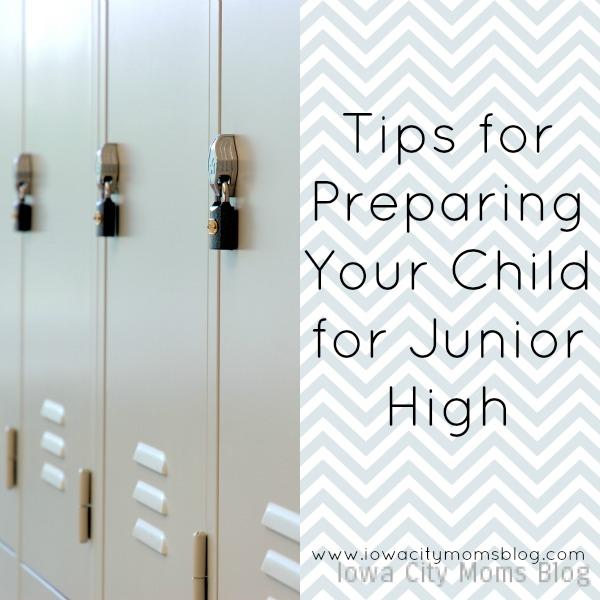The transition from 6th grade elementary to 7th grade junior high is probably the most challenging in a student’s academic career—not as traumatic for the parents as the move into kindergarten, but it is close. I’ve seen about 4,000 students make this transition in the Iowa City school district in the past ten years and I’m happy to pass on some of the lessons I’ve learned both as a parent and as a principal. I have some small recommendations and some bigger ideas, so here they go in no particular order.
Before school starts…
It’s not about the supplies.
Don’t worry about getting all of the “suggested” supplies before school starts. In order to start the first day of class, students just need some paper and a writing utensil. Since there are so many different classes and so many different teachers, wait to purchase specific items until after the first week.
Embrace registration.
Try your best to make it to registration. During this time, students receive their schedules and locker assignment, and their school portraits are taken. Registration provides a nice relaxed time to walk through the schedule and orient you and your child to the building.
While at registration, practice with the locker.
Lockers stress students out; they just do. At Northwest, we recommend that parents use registration time to help their student learn how to manipulate the lock. This is a skill that every junior high student will master within a few days, but there is no way to ease the stress other than by practicing. I recommend that students open their lockers 10 times after getting their combinations.
After School Begins…
Organization Is a State of Mind
The first trimester of 7th grade tests students’ organizational skills more than their pure academic abilities. According to Shakespeare, Henry V told his soldiers, “Everything be ready if the minds be so,” and this applies to junior high as much as it did to medieval warfare. Find time in the car or at dinner to sneak in some conversations which will force your sons and daughters to think through their day and how they will organize themselves. Try, “Have you thought about what you will do with your PE clothes?” or “How will you use your time in the morning before first period?” Now I realize that junior high-age kids do not readily warm up to conversations like these, so be a ninja parent, sneaking in these conversations when you sense an opening.
Here are some other ideas to help your child think through various organizational challenges:
- Music lessons—What will be your system for remembering to go to your music lessons?
- Alternating day classes—How will you remember which set of books to take for alternating classes? (Hint: At Northwest, there is a sign in the foyer.)
- Homework—How will you keep track of your assignments? (Hint: Every Northwest student receives an assignment notebook. )
- Athletics—What will you use to take your gear to school? When will you put it in your gym locker?
- Technology—Where will you keep your phone so it is safe and not a distraction at school? (Hint: Students are asked to keep them locked in their locker and not to access phones from the start of school to the end of the school day.)
- Money and prized possessions—Where will you keep these items during the day? (Hint: Students in junior high should not bring large quantities of money or valuable items to school.)
Use PowerSchool Wisely
PowerSchool is the district’s on-line database which allows parents to see attendance and assignment information for every class. It is a great way for parents to make sure that students are completing assignments. Keep in mind, however, that at the beginning of every term, there is a sample size issue which exaggerates the grades. For example, it is fairly typical and satisfactory for a student to get 4 out of 5 on an assignment. On PowerSchool, however, often parents only see the 80% B- that sits next to the score and instantly become stressed by the less-than-perfect mark. If I could change anything about the PowerSchool system, it would be that that the letter grade would be hidden until at least October. This is all to say that using PowerSchool wisely means to be patient in looking at the actual grade and to focus instead on homework completion and dates of upcoming tests and projects.
A Clean, Well-Lit Place
Students have homework every day in junior high. It may not be much, but it will be an expectation from teachers that students complete homework by the start of class the following day. To support this, establish a routine right away. Make sure that your child has a clean, quiet and well-lit place to study and a span of time (before or after dinner) committed to homework.
Last Thoughts
Going into junior high is a good time to communicate some basic expectations with your son or daughter. As a parent myself, I suggest to come to some agreement with your spouse, partner, or other family member about a few general precepts. In my family, my wife and I organized our parenting philosophy around the ideas of movement, music, and academic engagement.
We really wanted our daughters to be involved in some activity that involves movement every day. This could be a junior high sport such as cross country, volleyball or football, but it could also be dance, martial arts or even fencing! Given the strength of the music programs in the Iowa City School community, we also stressed involvement in music through band, choir, or orchestra. Yes, these activities positively correlate with higher academic achievement, but they are also just a great way to break up the school day, meet new students, and be part of something bigger than yourself. Finally, we stressed the importance of academic engagement every day. This is not about grades, but about learning. Students should be mentally present and trying in every class. The idea here is that it is OK for students not to get all A’s, but it is not OK not to be engaged in your classes.
Junior high can be as rewarding as it can be stressful. With some active parenting, students will grow, learn, be ready for their next adventures in high school and look back fondly on their experience in junior high.
About Our Guest Blogger
Special thanks to our Guest Blogger, Principal Gregg Shoultz, for giving us these fantastic tips!
Gregg Shoultz earned a PhD in Educational Administration from the University of Iowa and has been the Principal of Northwest Junior High School since 2003. Prior to working in school administration, he taught in Illinois, Guam and Switzerland.













As the parent of a new 8th grader, I’d like to add a few things that I learned last year to these great tips from Dr. Schoultz:
Never believe your 7th grader when they say about their homework, “I’ll get it done in study hall!”
Remind them to bring PE clothes home once a week for a washing.
Custodians are very helpful if you want to visit your child’s locker after school to look for any of those assignments Power School says are missing!
Peer influence is now more powerful than parental influence–so when you need a consequence (either positive or negative) anything to do with peers is effective (for example, “You can go to the dance at school only if…” or “If you don’t get your grades up, no Internet use.”)
Kids can have 7-8 teachers each day. Each teacher sees hundreds of students. It is impossible for them to keep every parent informed about everything happening in class. The days of emailing the teacher and getting problems addressed quickly are over. You may not even know there is a problem–many teachers update Power School only periodically–until late in the Trimester. And maybe that’s a good thing. You have to let your kid try to figure junior high out on their own. Praise them heartily if they manage it. Help them figure out how to do it better if they can’t manage it. It’s tough, but they need to learn to learn how to handle it on their own so that they’re ready for high school.
If your student doesn’t get great grades, it won’t count against her/him in high school. GPAs start being serious business in 9th grade.
Remember to enjoy your 7th grader. They get so tall, and try to act so grown up! But they are really silly and fun–still your little one (just in a big body!)
Thank you for sharing, Jen!! These are great tips as well!!